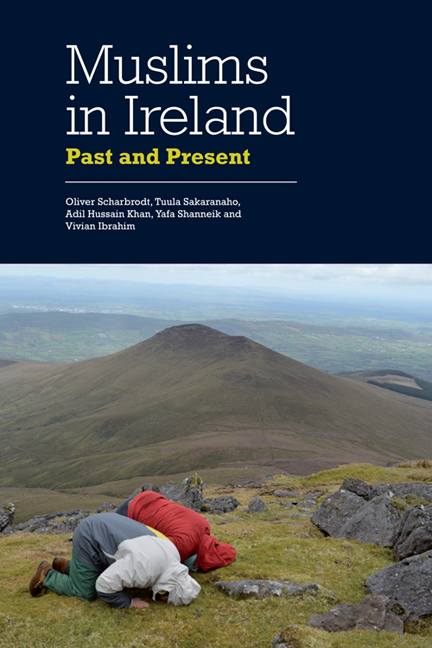Book contents
- Frontmatter
- Contents
- Figures
- Acknowledgements
- Introduction
- I History of Muslim Presence and Immigration to Ireland
- II Mosques, Organisations and Leadership
- 3 Early Muslim Organisations and Mosques in Ireland
- 4 Political Islam in Ireland and the Role of Muslim Brotherhood Networks
- 5 Mosque Communities and Muslim Organisations in Dublin and Other Cities
- III The Governance of Islam in the Republic of Ireland: Freedom of Religion and Islamic Education
- IV Diaspora and Identity
- Conclusion: Being Irish, Being Muslim
- Bibliography
- Index
3 - Early Muslim Organisations and Mosques in Ireland
from II - Mosques, Organisations and Leadership
Published online by Cambridge University Press: 05 August 2016
- Frontmatter
- Contents
- Figures
- Acknowledgements
- Introduction
- I History of Muslim Presence and Immigration to Ireland
- II Mosques, Organisations and Leadership
- 3 Early Muslim Organisations and Mosques in Ireland
- 4 Political Islam in Ireland and the Role of Muslim Brotherhood Networks
- 5 Mosque Communities and Muslim Organisations in Dublin and Other Cities
- III The Governance of Islam in the Republic of Ireland: Freedom of Religion and Islamic Education
- IV Diaspora and Identity
- Conclusion: Being Irish, Being Muslim
- Bibliography
- Index
Summary
Constructing a Narrative about Muslim Organisations in Ireland
The task of researching the historical development of Muslim institutions in Ireland is a challenging endeavour, owing to a lack of scholarship regarding the earliest Muslims in the country. The mere fact that all Irish Muslim institutions and mosque organisations were formed within living memory provides a great opportunity to look beyond conventional literary sources of scholarship and deal directly with first-hand accounts of the people involved in establishing the organisations in question before their recollections are lost. These oral traditions circulating among Muslim communities in Ireland have been the primary basis for nearly all subsequent research on the topic, including the construction of a narrative of Muslim organisations in Ireland below. The timeliness of this undertaking has presented itself at a point when many ageing members of Muslim communities in the country are still available for comment. This research inherently coincides therefore with a living tradition of real people whose lives have shaped the outcome of this work profoundly.
Prevailing accounts about the formation of Muslim institutions in the public discourse are primarily based on the institutions’ personal websites, which are not always accurate, for various reasons, including unintentional errors. The lack of scholarship about the development of this history makes it difficult to challenge these narratives without additional evidence or support, insofar as that would be necessary in any given case. This also means that verifying the narrative presented here with external sources is problematic and in itself subject to the same criticisms, since it too is largely based on what amounts to alternative accounts of the same living tradition or oral history, which at times may be anecdotal. The advantage of making use of these sources at present is that they have resulted, below, in what is intended to be a synthesis of conflicting memoirs set out in a coherent fashion, which may contribute towards the development of narratives of Muslims in Ireland.
In my own research on Islam in Ireland, I have attempted to evaluate these narratives in a way capable of providing a framework for looking at the broader historical context for the formation of Muslim institutions in Ireland, even though this remains a product of available source material, including personal accounts of living members of Irish Muslim communities.
- Type
- Chapter
- Information
- Muslims in IrelandPast and Present, pp. 75 - 90Publisher: Edinburgh University PressPrint publication year: 2015



